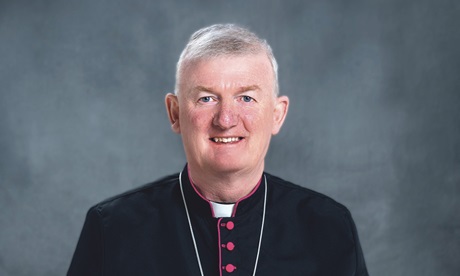The Royal Commission of Inquiry into Abuse in Care’s final report has changed the Catholic Church in New Zealand, says Palmerston North diocese’s Catholic bishop John Adams.
Adams (pictured) chose to speak to media about the report so he could put a face to the Church’s response to the Royal Commission’s findings.
The Royal Commission found between 1950 and 2019 over 250,000 vulnerable people were abused and neglected at places where they were meant to be cared for, including faith-based institutions.
The Church’s culture has been changing since the early 2000s, Adams told Stuff. The Royal Commission’s report has prompted further changes which are now embedded throughout the country.
Change well underway
The changes in the Church began after the Boston Globe newspaper revealed widespread sexual abuse by priests in the US, Adams says.
The closed mouth silence about sex abuse that was prevalent then no longer exists. A generation later there’s zero appetite for that culture in the Church, he says.
Where in the past there was no accountability and leaders failed, checks and balances are now in place to ensure this doesn’t happen again.
Just the same, it is important to avoid assuming the old culture remains in the past. “There are vulnerabilities still” he says.
Changes made
Adams summarises a swathe of changes the Catholic Church in New Zealand has instigated:
- All New Zealand’s Catholic parishes have material about safeguarding
- All volunteers who will work with others are given safeguarding training and must have a police check.
- Police checks are mandatory for anyone applying to join the seminary to become a priest and must undergo psychological testing
- All dioceses in New Zealand have safeguarding officers
- A national office for professional standards has been set up to promote safeguarding and hear complainants. It has an independent complaint process
- Priests are expected to complete safeguarding qualifications
- Accusations against church members result in their being stood down and their accusers are advised to contact the police
- Priests found guilty of profound misconduct are no longer involved in active ministry
Redress
The Government is now turning its attention to providing redress for the survivors. What this will involve will be announced later this year.
Adams says the Church will wait for the Government to announce its strategy before considering redress. This could include compensation and providing counselling, he said.
He encourages anyone who has been abused to go to the police. They may also contact the national office for professional standards, his office or survivor groups.
Source
Where to get help:
- Need to Talk? Free call or text 1737 any time to speak to a trained counsellor, for any reason.
- Lifeline: 0800 543 354 or text HELP to 4357
- Suicide Crisis Helpline: 0508 828 865/ 0508 TAUTOKO (24/7). This is a service for people who may be thinking about suicide, or those who are concerned about family or friends.
- Depression Helpline: 0800 111 757 (24/7) or text 4202
- Samaritans: 0800 726 666 (24/7)
- Youthline: 0800 376 633 (24/7) or free text 234 or email talk@youthline.co.nz
- What’s Up: free counselling for 5 to 19 years old, online chat 11am-10.30pm 7days/week or free phone 0800 WHATSUP / 0800 9428 787 11am-11pm Asian Family Services: 0800 862 342 Monday to Friday 9am to 8pm or text 832 Monday to Friday 9am – 5pm. Languages spoken: Mandarin, Cantonese, Korean, Vietnamese, Thai, Japanese, Hindi, Gujarati, Marathi and English.
- Rural Support Trust Helpline: 0800 787 254
- Healthline: 0800 611 116
- Rainbow Youth: (09) 376 4155
- OUTLine: 0800 688 5463 (6pm-9pm)
- If it is an emergency and you feel like you or someone else is at risk, call 111.
Sexual Violence
- NZ Police
- Victim Support 0800 842 846
- Rape Crisis 0800 88 33 00
- Rape Prevention Education
- Empowerment Trust
- HELP Call 24/7 (Auckland): 09 623 1700, (Wellington): 04 801 6655- push 0 at the menu
- Safe to talk: a 24/7 confidential helpline for survivors, support people and those with harmful sexual behaviour: 0800044334
- Male Survivors Aotearoa
- Survivors Network of those Abused by Priests (SNAP) 022 344 0496
Additional reading
News category: Great reads, New Zealand, Top Story.




